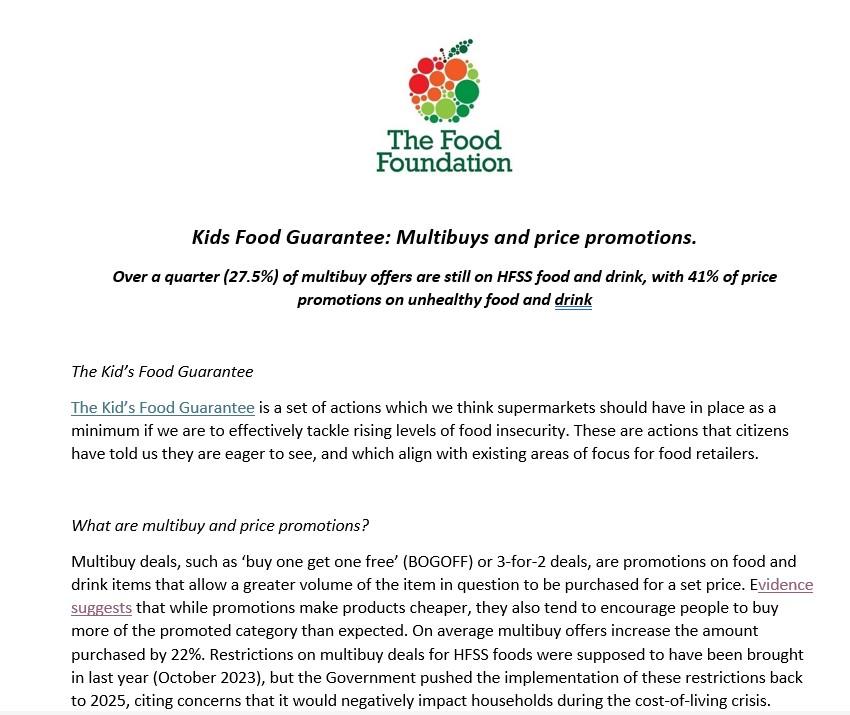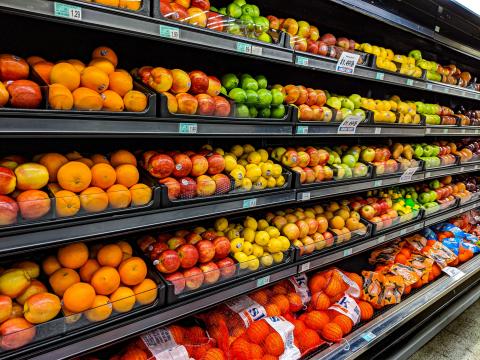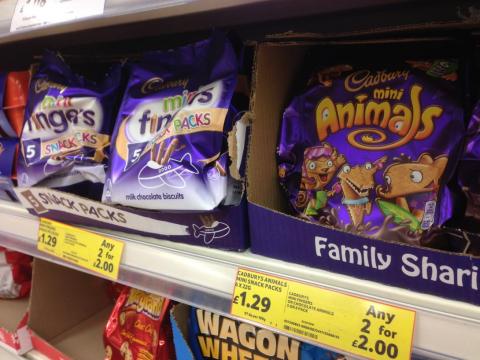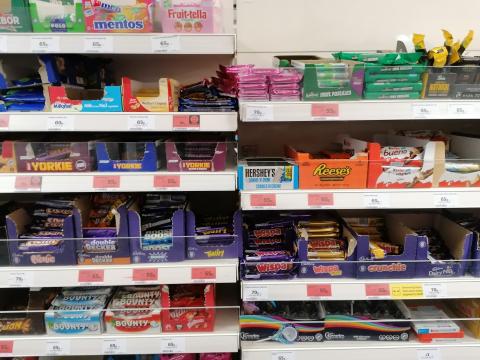
Kids Food Guarantee: Multibuys and price promotions update
Kids Food Guarantee: Multibuys and price promotions.
Over a quarter (27.5%) of multibuy offers are still on HFSS food and drink, with 41% of price promotions on unhealthy food and drink
The Kid’s Food Guarantee is a set of actions which we think supermarkets should have in place as a minimum if we are to effectively tackle rising levels of food insecurity. These are actions that citizens have told us they are eager to see, and which align with existing areas of focus for food retailers.
What are multibuy and price promotions?
Multibuy deals, such as ‘buy one get one free’ (BOGOFF) or 3-for-2 deals, are promotions on food and drink items that allow a greater volume of the item in question to be purchased for a set price.
Evidence suggests that while promotions make products cheaper, they also tend to encourage people to buy more of the promoted category than expected.
On average multibuy offers increase the amount purchased by 22%. Restrictions on multibuy deals for HFSS foods were supposed to have been brought in last year (October 2023), but the Government pushed the implementation of these restrictions back to 2025, citing concerns that it would negatively impact households during the cost-of-living crisis.
Price promotions are retail promotions that offer discounted pricing on selected products for a temporary period of time. This includes offers such as ‘reduced from £4.50 to £4’ or discount pricing offered as part of loyalty card schemes.
Although price is a major driver of food choice, price promotions were not included as part of the government's plans to restrict retail promotions of HFSS foods due to concerns that this would increase the cost of food for citizens.
What did we do?
To monitor this Guarantee area we worked with Questionmark Foundation, an international non-profit think tank, to look at what type of foods are included as part of multibuy and price promotion deals.
For multibuys, data was collected for the period 22nd – 25th August 2023 and compared to data collected between 18th and 24th April and 19th to 26th July 2023. For price promotions, data was collected for the period 22nd- 25th August 2023 only.
We looked at food promotions available across the five largest UK retailers; Aldi, ASDA, Morrisons, Sainsbury’s and Tesco.
Multibuy deals in scope were volume promotions, for example “buy one get one free” (BOGOF) deals where customers benefit if more than one item (of the same) product is bought.
Price promotions in scope were offers that discounted prices compared to an original price or discounted prices as part of customer loyalty schemes (e.g. Clubcard price). We excluded those offers involving points for future redemption (e.g. 200 bonus nectar points).
We looked at whether both price and volume promotions were on High Fat, Salt, Sugar (HFSS) foods, staple carbohydrate products(1), and other healthy essentials such as fruit and veg. We used the Government’s Nutrition Profiling Model to assess the healthiness of offers, which uses a wider, more rigorous definition of HFSS compared to the definition used in the guidance for restricting location-based promotion of HFSS food and drink.
Using these criteria foods scoring 4 or more points and drinks scoring 1 or more points are classified as high in sugar, salt and/or fat (HFSS).
For further details on the methodology used in the Kid’s Food Guarantee and our inclusion and exclusion criteria read our technical report.
What’s changed with Multibuys?
Very little has changed since our last update in July. Amongst those retailers running multibuy deals, there was no notable change in the total number of multibuy deals offered in August compared to July.
The encouraging trend towards a greater proportion of volume promotions on fruit and veg and staple carbohydrates that we saw in July disappeared in August.
In August there was a slight decrease in the proportion of multibuys on fruit and vegetables (from 4.5% in July to 4.1% in August) and in offers on staple carbohydrates (from 4.2% in July to 3%).
Instead, retailers are continuing to focus their promotional spend on HFSS foods and drinks, with over a quarter (27.5%) of offers on food and drink defined as high in fat, salt and/or sugar (HFSS).
This has barely changed since July when 27.3% of multibuy offers were on HFSS food and drink, and is similar to April’s findings, when 29% of multibuy offers were on HFSS food and drink.
Additional analysis in August looking at multibuy offers on dairy products, a staple product for many families with young children, found that these are predominantly on cheese products (which can be high in saturated fat and sodium) rather than on milk or yogurts. 31% of dairy multibuy offers are on cheese compared to only 6% of dairy offers on milk and just 0.6% on plain unsweetened yogurt.
How are retailers performing on multibuy offers?
Across the retailers we analysed, Aldi and Sainsbury’s have a policy of not running multibuy offers, although our research identified that Sainsbury's did have a very small number of offers on non HFSS soft drinks and fruit and veg running online in August.
We found that Tesco, ASDA and Morrison’s continue to run offers on HFSS foods and non-alcoholic drinks, with Tesco having the smallest number of multibuy offers on HFSS products (as defined by the NPM model).
The proportion of offers on HFSS food and drink has remained broadly very similar to July, although there was a decrease across the board for the proportion of multibuy offers on staple carbohydrates.
Price promotions
41% of price promotions are on food and drinks high in salt, sugar and fat – well over a third of all offers(2).
A much greater number of price promotions were run by retailers in August compared to the number of volume (Buy-One-Get-One-Free or BOGOF) promotions – 61% of all price and volume promotions we looked at were price promotions.
Similarly to multibuys offers on healthy staples, very few price promotions are on healthier foods. Just 3.3% of price promotions are on fruit and veg with only 3.9% of offers on staple carbohydrates.
How are retailers performing on price promotions?
All five of the major UK retailers offer price promotions, although Aldi – with a policy of everyday low prices – has only a very small number of price promotions.
Interestingly, given that both have policies not to offer multibuy deals on HFSS food and drinks, Tesco and Sainsbury’s have the greatest proportion of price promotions on HFSS foods of the five main UK retailers we looked at.
14% of price promotion deals for the big five retailers are on HFSS food and drink at Sainsbury’s, and 10% of price promotion deals are on HFSS food and drink at Tesco.
Only a very small number of price promotions across all five retailers currently include staple carbohydrates, with Morrison’s offering the largest proportion of price promotions on staple carbohydrates at just 1.1%.
What we want to see:
Where retailers do offer multibuy deals and price promotions, and provided that any cost savings aren’t simply pushed back onto growers and producers, these offers should be on staple foods that contribute to a healthy diet rather than discretionary foods that we ought to be eating less of.
For example, promotions could support families to buy staple carbohydrates such as bread and rice, as well as fruit and veg, milk and eggs.
We would urge the government to reconsider their delay of the planned restriction on HFSS volume promotions. HFSS volume promotion restrictions already have the necessary legislation in place to be swiftly implemented and yet they have been delayed until 2025.
There is also a need for government to review other types of promotions which are common on HFSS foods, such as price promotions, and implement policies which incentivise businesses to shift these promotions to non HFSS foods.
Ensuring more promotions are on healthier foods and staples would also alleviate concerns that any restrictions on food promotions will increase prices for consumers.
Moreover, although the government is reluctant to regulate the types of foods included within price promotions, the large number of price promotions offered by major retailers suggests that they are a key retail marketing tool used to incentivise sales of certain products.
Given that 41% of such price promotions are on HFSS food and drink, both government and retailers ought to look at what can be done to ensure such deals are on healthier food and drink as part of efforts to report on and achieve a higher proportion of healthier sales.
______________________________________
(1) Staple carbohydrates were defined as plain carbohydrates in their simplest form, including rice, pasta, grains, potatoes, lentils, beans (including dried and tinned), and loaves of bread (excluding rolls and pitta breads etc).
(2) The category ‘Other’ includes those products where nutrient information is missing online, which makes it difficult to calculate an (accurate) NPM score and determine whether the product is HFSS or not. The non HFSS category includes a wide range of foods with an NPM score of less than 4, including herbs and spices, composite foods, as well as fruit, veg and milk.





